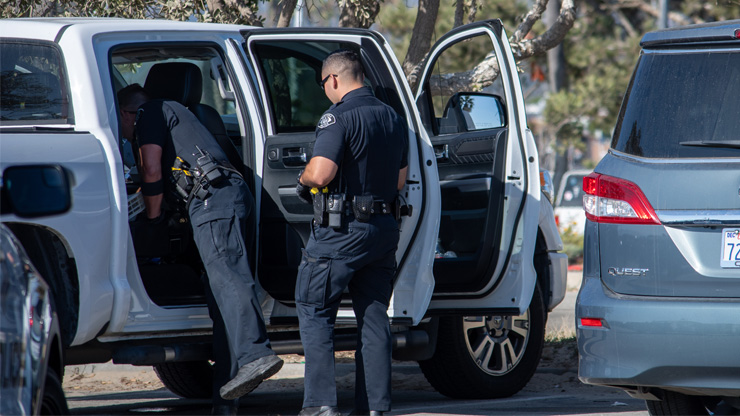
We hear it in movies and on TV all the time, but what is probable cause and why is it important? Probable cause is the burden of proof that a police officer must meet prior to placing someone under arrest or performing a search. The reason it is important is if a police officer arrests a suspect or performs a search without probable cause, then the arrest or the fruits of that search could possibly be suppressed in court. In theory, this sounds like a very simple concept. However, in practice, the analysis can get extremely complicated. There are several factors that the courts will analyze to determine whether a police officer actually had probable cause. In fact, there are thousands of cases at both the state and federal level where the courts have published opinions considering a multitude of different scenarios when it comes to determining probable cause.
Burden of Proof
In order to understand probable cause, it helps to take a look at where it stands as it relates to other legally established burdens of proof. The highest burden of proof is “Beyond a Reasonable Doubt”, which is the burden placed on the state to gain a conviction at a criminal trial. The lowest burden is “Reasonable Suspicion” which allows a police officer to perform a quick search for weapons known as a “Terry Search”. Listed below are the different levels of burden of proof.
Searches
Prior to conducting a search a police officer is usually required to get a search warrant signed by a judge. In order to get a warrant, the officer must present a judge with a search warrant application detailing all the reasons the officer has for believing that evidence of a crime may be in a particular location. For instance, the officer could say that he spoke with a confidential informant that told him John Smith had a stolen big screen TV in his house. The Judge would then consider the statement and decide whether or not to issue the warrant. Should the warrant be signed, the police officer would be able to search the places specified on the warrant for the items determined to be of evidentiary value.
In the above example, the police could search John Smith’s house to try and find the stolen big screen TV. The scope of the search would be limited to the places listed on the warrant (John’s House) and the specific types of items that the police are looking for (a stolen big screen TV). The police would not be allowed to search other locations, such as John’s place of business, or any areas that are not capable of concealing a big screen TV, such as filing cabinets or dresser drawers.
Exigent Circumstances
One exception to the warrant requirement is exigent circumstances. If a police officer believes that waiting for a judge to sign a warrant would lead to the destruction of evidence or physical harm to the officer or another person, then the officer may conduct the search without a warrant. When evaluating exigent circumstances, courts will try to determine whether it was reasonable for the officer to believe that waiting for a warrant would have led to the destruction of evidence or harm to others. Courts will also consider whether the suspect was armed, able to flee, able to destroy evidence, the safety of others, and whether there was a serious crime committed. Should the courts determine the officer acted without exigent circumstances, any evidence found as a result of the search could be suppressed.
Scope of Search
As mentioned before, any search the police conduct will be limited based on what they are looking for. If a police officer does not have probable cause to conduct a search but they have reasonable suspicion to frisk a suspect for weapons, the officer could to a quick pat down of the suspect. If the officer decided to exceed the scope of the search and start digging through pockets and having the suspect take off their shoes, then anything found in that search would be subject to suppression.
Likewise, if police have a search warrant specifying a particular place to be searched and particular items that may be seized, that does not give police cart blanche to search anything and everything they want. Using our previous example where the police are looking for a big screen TV at John Smith’s house, the police would not be able to search any cars that may be parked in front of the house, nor would they be able to search areas such as cabinets and draws that would not be capable of concealing a big screen TV.
Plain View Doctrine
If a police officer is executing a warrant in good faith and happens to notice evidence of a crime located in plain view, the officer would then be able to seize that item. For instance, if police are looking for a big screen TV and find cocaine sitting out on the coffee table in the living room, the police could seize the alleged cocaine and charge the occupant accordingly. The only requirements for the plain view doctrine are that the evidence must be in plain view and must be readily identifiable as incriminating. Similarly, the Plain Feel Doctrine would allow an officer to seize contraband during a pat down search if the officer does not exceed the scope of the pat down and reasonably believes the object to be evidence of a crime.
What police officers look for to get probable cause
The majority of searches concerning exigent circumstances occur during traffic stops. This is because if the officer were to wait for a warrant, the vehicle occupant could simply drive off and potentially destroy any evidence before the officer would be able to get a warrant. Because of this, police are trained to look for certain things that would allow them to search the vehicle, such as:
Consent to Search
If all else fails, the police may just ask for permission to search a suspect or a vehicle. Surprisingly, it is rare for police to be denied consent to search when they ask. This may be because the person being searched wants to appear cooperative and believes this may be beneficial for them down the road. It is almost never a good idea to consent to a search, because once the police have permission, they are no longer required to show they had probable cause or exigent circumstances and whatever they find will likely not be suppressible in court.
If you deny the police permission to search you will often be asked follow up questions such as “why don’t you want me to search?” or “are you trying to hide something?”. It is important to know that you never have to justify the reasons for exercising your 4th amendment right to be free from illegal search and seizure and if officers ask these questions, you should politely refuse to answer.
